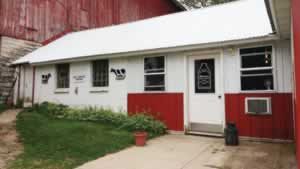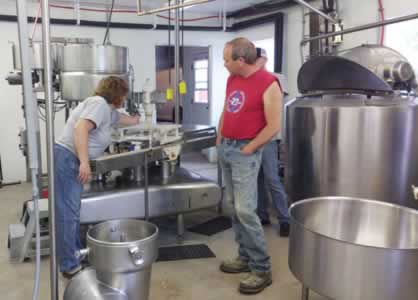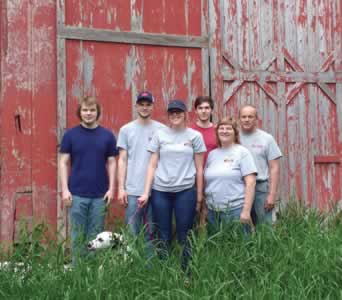Dairy farmers Bob and Jeanette Kappers can tell you where nearly each ounce of milk and
hour of each day on their farm has gone. They are down-to-earth, welcoming, and eager to share their love for an industry and a way of life.

While Bob grew up ona dairy farm in Spring Valley, Jeanette was a townie, raised in Chatfield. After getting married, they stumbled upon a farm for rent, situated in the Chosen Valley of Jeanette’s hometown. It sat nestled into a nook east of where the Mill Creek meets the North Branch Root River, which then winds through the western portion of the farm. Right in the heart of it sat one big, red horse barn with wood-pegconstruction and topped by two cupolas.
Five years later, in 1984, they purchased the 150-acre farm and fully converted it to suit the needs of 50 head of Holstein cows. “Bob always had a plan. He’s an outside of the box thinker,” says Jeanette proudly.
Just shy of two decades later, in 2002, after years of work, littleprofit, and a growing family, the couple began seriously considering putting ideas into motion. “We thought, ‘There has to be something else,’” remembers Bob. “We love this life, but we had to make money.”
While the farm had the remnants of a milk bottling plant on the premises, it came with a big learning curve. They did what they could with what they had, but eventually, the family cut back on the number of cows they milked to make time to get things up and running. “We couldn’t do both,” says Bob. In 2004, they took the leap and began major improvements, beginning with building a licensed milk plant. The plant pumps milk directly from the cooling bulk tank in the milking parlor through stainless steel piping to the processing vats and automated bottling system. “We never touch the milk. It comes straight from the cow to you,” says Jeanette.
By December of 2004, Kappers opened their storefront. It has been open 365 days a year since. Initially, the farm sold only bottled milk and cream on-farm and by handdeliveries. “We have a very supportive town base,” says Bob, staunchly. “They are a very loyal and dependable people.” The Kappers’ efforts caught on and a handful of stores began offering their milk and cream.

“People are shocked at the glass bottles,” says Jeanette. It’s not just that they’re sold in glass, but it is noticeably well-rounded and creamy. “It’s fresh milk, from our own cows.”
The family also knew that how the cows are raised and what they’re fed played into the taste. They’re proponents of healthy land and animals and the herd is mainly grass-based, but receives additional corn or barley to round out their ration. Even the lushness of the spring pastures can make a pronounced change in the milk flavor. “We can’t put them all out to pasture at once,” chuckles Bob.
Even though milk sales were good, customers kept asking for more. Additionally, the short seven-day timeframe the farm had to move the milk made things a challenge. “It’s tough, the bottom end of it, especially if you have no history to go on,” admits Bob.
In 2008, they began selling at Rochester’s Downtown Farmers Market offering several taste preferences from skim to whole and the always popular chocolate milk. Two years later they added Winona Farmers Market to their rotation.
Realizing they’d gotten a hold of a great niche market, the family enlisted the help of a local banker, who also thought outside the box, and several advisors. They guided the farm’s plans to make further improvements and increase the products available. In 2011, the farm added hand-pulled cheese curds to their offerings. The successes of that propelled the next addition a year later: fresh ice cream.
The couple tried making it work with what they had, but knew if they wanted to do it right, they’d need the right equipment. Unable to secure the funding for a new icecream machine and blast freezer, they again turned into thinking in creative ways. Consumer Supported Agriculture (CSA) shares of produce was finding big successes in the country and the family wondered if shares in ice cream could provide the front-end capital needed to fund the equipment. Nearly 200 people signed up for initial shares in their ice cream venture. The Kappers perfected their five-ingredient base recipe, which includes no corn syrup, and after some trial and error with flavors, they were off and running.
By 2014, the farm had added St. Paul Downtown Farmers Market to the list of Saturday venues and two years following, Mill City Market in Minneapolis was also added.
While markets are a vital part of the farm to table movement, the quaint ambiance and old-fashioned farm romance can mask the intense work that goes on behind the scenes. The couple emphasizes that they wouldn’t have been able to do any of it alone and is quick to note their gratitude for those that help, especially sons Jacob, Luke, and Ethan, and Luke’s girlfriend, Jenna. “They’re our best help,” enthuses Jeanette. “They get roped into a lot. Anytime we need help, they step up.”
The farm also employs several part-time workers, including a retiree who makes store deliveries and several high school students who assist with cleaning in the plant. The bulk of the work, however,remains with the family with Bob doing nearly all the milking and everyone working with bottling, product production, and market days. “We divvy up the work load to make it all work. Everybody pitches in,” stresses Jeanette.
“With markets, it’s a guessing game,” says Luke. “Every city, every market is different [with rules and regulations]. We’re selling out every week, but it’s a good problem to have.”
A portion of the items for market is loaded Friday nights. Saturday morning, they arise at 3 a.m. to load the products and head off to their various destinations: Winona, Rochester, St. Paul, and Minneapolis. With more than a decade of markets under their belt, that makes for a lot of early mornings and time on the road.
Monday and Tuesday are easily 18-hour days. Others aren’t quite so grueling, they say, not flinching. They’re more like 12 hour days. “We can sleep when we’re dead,” jokes Jeanette in an upbeat fashion. “
There are days you wonder why you’re doing it, but it’s so worth it. Every day is different, interesting, and never dull. There’s never a thoughtless day.”
Thursdays on First, a high demand, limited space, specialty summer market in Rochester is the newest addition for Kappers. In addition to the milk, cream, cheese curds, and ice cream already offered, the farm will now be marketing fried curds and ice cream, cream brulé, and gelato.

The farm hasn’t lost its roots though; local availability and home delivery is still the foundation. They currently provide products to Community Grounds Market, Pedal Pushers Café, and Another Time Ice Cream in Lanesboro, Rushford Foods and Jessie Street Java in Rushford, Eyota Market store, People’s Co-op, Café Steam, Old Abe Coffee Co., Porch and Cellar, and HyVee in Rochester, and Carlson Roasting Company in Houston. It is hand-delivered weekly to 45 households in Chatfield.
“We’d still like to build our home deliveries,” notes Bob. “We’ll deliver to any town if at least ten homes participate.” The farm is the only dairy farm in Fillmore County to make home deliveries and only a handful within the state. Adding to the prestige, they’re one of only two farms in the state that bottle their own milk. “They’re asking for more still today.”
A butter churcn may be the next project on the list, according to Bob. Following on the success of the ice cream shares, the farm may begin selling shares of butter and buttermilk. Even the thought of sour cream and hard cheeses has been a possibility down the line. “You have to find a balance,” says Jeanette, as she describes keeping the long hours and scheduling of processing and sales in check with the things the family can dream up to do on their farm.
For now, the family will continue to focus on increasing the marketing of their products while stressing the importance of the dairy industry.
“We’re getting first-hand feedback from the consumer,” adds Bob. “We get a lot of questions. Educating is an important part.” The farm is affiliated with or has served with the American Dairy Association, Milk Marketing Board, Minnesota Grown, and Fillmore County Fair Board. In 2015, they were selected as a Minnesota
Farm Family for Fillmore County.
Kappers is building additional opportunities for education through fun events and tours, especially those for youth, product donation for non-profit organizations, and original touches such as its tongue in cheek bovine Employee of the Month recognition. A revamped online presence, driven by Luke and Jenna, is also a springboard for education on the farm’s website, Facebook, and Twitter pages.
“We’re in a growing pang,” says
Jeanette. “It’s a hard thing to balance. We’re not quite big, but we’re trying to grow. But, we wouldn’t miss a minute of it.”
For more information about Kappers Big Red Barn, visit their website, kappersbigredbarn.com, or call (507) 867-3556. Or, better yet, visit them in person at the farm: 33218 County Highway 5, Chatfield. It is open 6 a.m. to 8 p.m. daily.


Leave a Reply